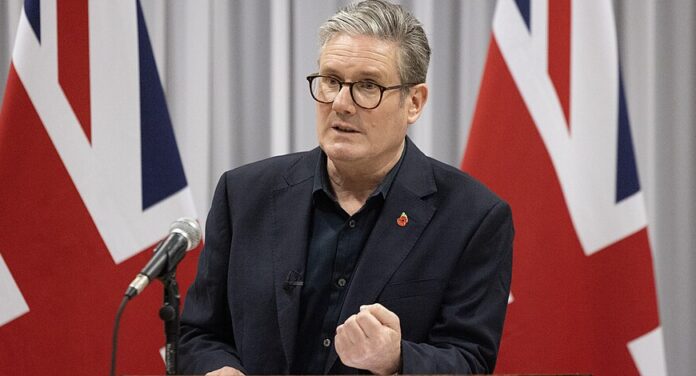PM accused of channelling Enoch Powell in crackdown speech as Labour MPs warn of racist overtones
Keir Starmer has defended his hardline new immigration plans after an explosive backlash from MPs, businesses, and human rights groups who accused him of echoing the divisive language of Enoch Powell. The prime minister insisted the UK must not become an “island of strangers,” sparking comparisons to Powell’s infamous “rivers of blood” speech — a link that has enraged Labour backbenchers and reignited tensions over Britain’s political direction on migration.
Speaking at a Downing Street press conference on Monday, Starmer unveiled a sweeping overhaul of immigration rules. He announced tougher English language requirements, stricter visa limits, and longer routes to citizenship. But it was his tone — warning of a nation losing its shared values unless migration is controlled — that lit a firestorm of criticism.
“In a diverse nation like ours,” Starmer said, “we risk becoming an island of strangers, not a nation that walks forward together.”
Labour MPs swiftly condemned the speech. Coventry South independent MP Zarah Sultana said Starmer had “imitated” Powell, whose 1968 speech became a rallying cry for the far-right. “Echoing it today is a disgrace,” she said. “It adds to anti-migrant rhetoric that puts lives at risk.”
Green Party leadership hopeful Zack Polanski labelled Starmer’s language “not even subtle,” while Labour MP Sarah Owen warned that the prime minister was “chasing the tail of the right” and dragging the country down a dark road. Nadia Whittome called the speech “shameful and dangerous,” and Bell Ribeiro-Addy endorsed that view, resharing it publicly.
Pressed to respond, Starmer tried to strike a careful balance. “Migrants make a massive contribution to the UK, and I would never denigrate that,” he told The Guardian. Yet he doubled down on the need for assimilation, saying migrants must “learn the language and integrate.”
Despite internal dissent, Starmer pressed ahead with the launch of a 69-page immigration white paper, which outlines plans to reduce net migration to around 300,000 by 2029. The number stood at 728,000 in the year to June 2024, down from more than 900,000 under the previous Conservative government.
The paper introduces a battery of changes: English tests for more visa categories, a hike in skill requirements for foreign workers, and a ten-year wait for citizenship, double the current threshold. Migrants could still fast-track their status if they work in the NHS, hold engineering posts, or make exceptional contributions to public life.
Starmer framed his plan as a long-overdue correction to Tory failings. “We’re fixing the broken immigration system to bring control to our borders,” he said. “This is about lowering net migration, delivering higher skills, backing British workers, and restoring trust after years of Conservative chaos.”
Yet the economic case has drawn scepticism too. Rain Newton-Smith, head of the Confederation of British Industry, pushed back against the notion that immigration is a cheap fix for labour shortages. “It is more expensive and difficult to hire from abroad,” she said. “Foreign workers are simply not the ‘easy’ alternative.”
Embed from Getty ImagesObservers say the speech reflects mounting pressure from Reform UK and Nigel Farage, whose anti-immigration platform made major gains in local elections. Critics accuse Starmer of political triangulation — aping right-wing rhetoric to neutralise their appeal.
With tensions rising inside Labour and a bruising public debate ahead, the backlash to Starmer’s “island of strangers” comment could deepen divides within his party. And with many questioning whether the new policies will actually deliver results, the prime minister’s immigration gamble may come at a heavy political price.
BBC
Prime Minister Keir Starmer has adopted strikingly tough language on immigration, acknowledging it as both a defining demographic shift and a persistent political failure. His phrase “an island of strangers” signals a departure from past Labour rhetoric, reflecting public anxiety and frustration over successive governments’ unmet promises. From Blair’s underestimated EU migration to Tory failures post-Brexit, public trust has eroded. Starmer’s tone and policy shift are driven partly by Reform UK’s rise, with Nigel Farage framing immigration as the elite’s blind spot. Starmer also challenged the consensus that immigration boosts economic growth, while weighing the real-world consequences on sectors like care and construction. His government’s current focus is on legal migration, with a crackdown underway. Illegal migration and a controversial EU youth mobility deal are next. Ministers claim it’s not a return to free movement, but debate is inevitable. Ultimately, Starmer’s credibility—and Labour’s broader legitimacy—now hinges on whether net migration visibly declines during his premiership.
FINANCIAL TIMES
Sir Keir Starmer’s government has unveiled a sweeping overhaul of the UK’s post-Brexit immigration system, curbing reliance on overseas labour and reversing earlier liberal policies. A new white paper restricts work visas to graduate-level roles, with limited, temporary exceptions for sectors with labour shortages. The settlement path will now be among the world’s longest, and higher visa fees and salary thresholds will make it one of the most expensive systems globally. The Home Office predicts these changes could reduce annual arrivals by about 100,000. However, economists argue the reforms will have minimal impact on per capita GDP growth. Critics warn of a short-term shock, especially for the already strained care sector, which faces an immediate visa route closure. While the government hopes employers will train more UK workers and reconfigure job structures, experts question how the reforms will function in practice. Ministers argue that the focus on graduate workers will raise public revenue and improve productivity, but uncertainty remains around sector-specific impacts.
